 Petzlover
Petzlover American Mastiff is originated from United States but Kangal Dog is originated from Turkey. American Mastiff may grow 6 cm / 3 inches higher than Kangal Dog. American Mastiff may weigh 27 kg / 60 pounds more than Kangal Dog. American Mastiff may live 3 years less than Kangal Dog. American Mastiff may have less litter size than Kangal Dog. American Mastiff requires Low Maintenance. But Kangal Dog requires Moderate Maintenance
American Mastiff is originated from United States but Kangal Dog is originated from Turkey. American Mastiff may grow 6 cm / 3 inches higher than Kangal Dog. American Mastiff may weigh 27 kg / 60 pounds more than Kangal Dog. American Mastiff may live 3 years less than Kangal Dog. American Mastiff may have less litter size than Kangal Dog. American Mastiff requires Low Maintenance. But Kangal Dog requires Moderate Maintenance
 The history of the American Mastiff is entirely tied to the old European Mastiffs but in particular the English Mastiff. The developers of the American Mastiff crossed the English Mastiff with the Anatolian Mastiff at the Ohio kennel, Flying W Farms. The founder of this breed is Fredricka Wagner. Because of this the English Mastiff and the American Mastiff look very much alike. The difference between the two is that the American Mastiff was bred to have less health concerns than the English Mastiff and without the drooling. In 2000 the CKC acknowledged that the American Mastiff and the English Mastiff were separate breeds.
The history of the American Mastiff is entirely tied to the old European Mastiffs but in particular the English Mastiff. The developers of the American Mastiff crossed the English Mastiff with the Anatolian Mastiff at the Ohio kennel, Flying W Farms. The founder of this breed is Fredricka Wagner. Because of this the English Mastiff and the American Mastiff look very much alike. The difference between the two is that the American Mastiff was bred to have less health concerns than the English Mastiff and without the drooling. In 2000 the CKC acknowledged that the American Mastiff and the English Mastiff were separate breeds.
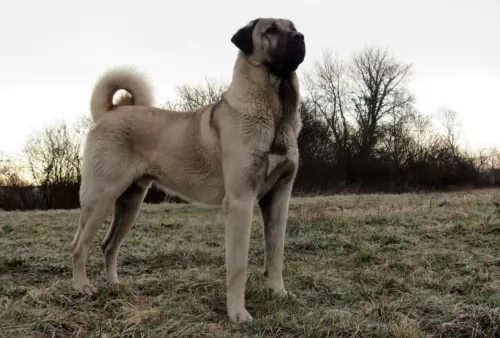 The magnificent looking Kangal Shepherd Dog, a purebred Mastiff type dog, is often referred to as a sheep dog and hails from the Sivas province of Turkey.
The magnificent looking Kangal Shepherd Dog, a purebred Mastiff type dog, is often referred to as a sheep dog and hails from the Sivas province of Turkey.
The Kangal Dog is a distinct breed and the National Dog of Turkey. These are working dogs who made their appearance in the UK in 1965.
It is interesting to note that in June 2018 the Turkish Kennel Club, Köpek Irklari ve Kinoloji Federasyonu, classifies Kangal Shepherd Dogs to be the same population as the Anatolian Shepherd dog.
 This crossing of the English Mastiff and the Anatolian Mastiff resulted in a Mastiff with a much drier, less drooling mouth than the other Mastiffs. This is a giant, massive dog – powerful and muscular. With a wide head that is rectangular rather than square. Their eyes are dark amber, and their ears are high on their head and rounded. With a medium size muzzle, black mask and heavy head, the American Mastiff is a handsome dog.
This crossing of the English Mastiff and the Anatolian Mastiff resulted in a Mastiff with a much drier, less drooling mouth than the other Mastiffs. This is a giant, massive dog – powerful and muscular. With a wide head that is rectangular rather than square. Their eyes are dark amber, and their ears are high on their head and rounded. With a medium size muzzle, black mask and heavy head, the American Mastiff is a handsome dog.
Their chest is broad, deep with ribs that extended backward. He has strong legs that are parallel and wide set. He also has a long tail. Puppies of the American Mastiff are born almost black and as they grow their coat color lightens. In addition, it is important that they have a wrinkled forehead as well and a scissors bite is preferred.
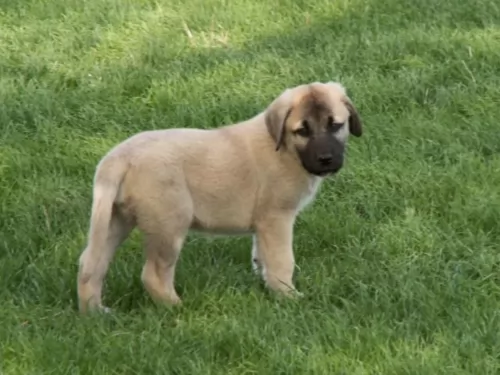 This is a large, heavily boned dog with a big head with a black mask and medium sized floppy ears. Looking at him, he has a Mastiff-like appearance but isn't as heavy as some Mastiff breeds, allowing it more speed and agility.
This is a large, heavily boned dog with a big head with a black mask and medium sized floppy ears. Looking at him, he has a Mastiff-like appearance but isn't as heavy as some Mastiff breeds, allowing it more speed and agility.
He stands at roughly 72cm to 85cm male and female, and weighs about 50 to 63kg. He has a solid double coat of dense hair which is a pale tan color.The coat is short and dense. The Kangal Dog is powerful and when he is alert, the long tail is held over the back, otherwise he holds it down with a slight curl.
The Kangal is known for his good looks, but he is also alert, sharp, territorial and confident, while also being calm. These dogs have an instinctive wariness of strange dogs and they are also reserved with strangers but are loving, loyal and protective with their human family.
In fact, the Kangal Shepherd Dog is protective while being gentle with small children and animals. He is an intelligent breed too, and having him trained and socialized won’t be a problem.
It is always a wise move to have a big dog like this trained and socialized, making him obedient and even more amicable than he already is.
 A love of children and devotion to his pack (family) is bred into the American Mastiff. He is non-aggressive unless you threaten his family or his children. Then he becomes courageous, protective and defensive. This is a gentle giant most of the time, however due to size and the need for strong leadership, the American Mastiff should be socialized and trained early. If they are socialized and trained they will be calm, gentle dogs. They will remain protective and alert, but they will be friendly with strangers. They love to please their people and being highly intelligent they learn fast.
A love of children and devotion to his pack (family) is bred into the American Mastiff. He is non-aggressive unless you threaten his family or his children. Then he becomes courageous, protective and defensive. This is a gentle giant most of the time, however due to size and the need for strong leadership, the American Mastiff should be socialized and trained early. If they are socialized and trained they will be calm, gentle dogs. They will remain protective and alert, but they will be friendly with strangers. They love to please their people and being highly intelligent they learn fast.
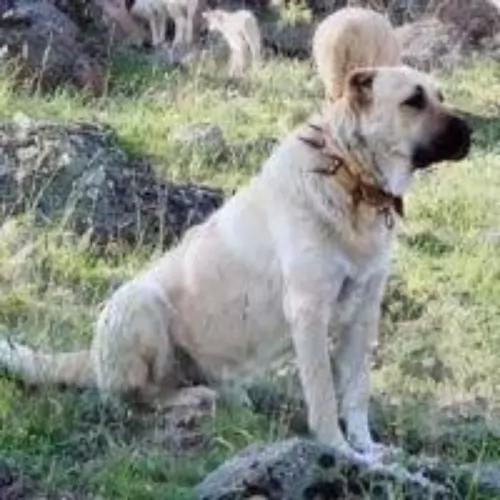 Your Kangal Dog is a big, powerful dog. His very size size won't suit him living in the city in small spaces and tiny gardens. He is far better suited to life in the suburbs or to country life where he can move around easily.
Your Kangal Dog is a big, powerful dog. His very size size won't suit him living in the city in small spaces and tiny gardens. He is far better suited to life in the suburbs or to country life where he can move around easily.
In spite of his size, he is a calm, balanced, independent, protective dog. He may well be aloof towards strangers, but a trained and well-socialized Kangal Dog is friendly, loving and loyal pet with his human family and with visitors to the house.
This is a beautiful dog and it will be an honor to have such a wonderful pet in your home. Treat him well and you're bound to have the most fantastic protector, guardian and friend.
 American Mastiffs seem to have fewer health issues than other larger giant breed dogs. However, they can experience allergies as many large, wrinkled dogs do. They also might have a tendency toward eye issues, hip dysplasia, cancer and heart disease. Bloat might be the most life-threatening issue many American Mastiffs experience.
American Mastiffs seem to have fewer health issues than other larger giant breed dogs. However, they can experience allergies as many large, wrinkled dogs do. They also might have a tendency toward eye issues, hip dysplasia, cancer and heart disease. Bloat might be the most life-threatening issue many American Mastiffs experience.
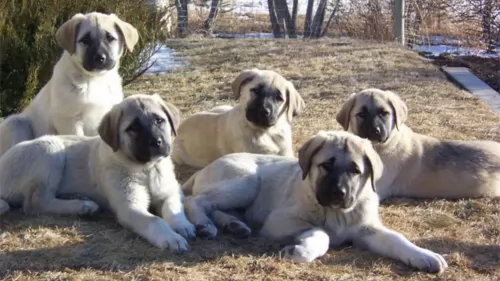 This is most important if you don't intend your Kangal Dog becoming a parent, and is good for the health of your dog.
This is most important if you don't intend your Kangal Dog becoming a parent, and is good for the health of your dog.
Your Kangal Dog puppy needs certain vaccinations at certain stages of his life to prevent him from getting some life threatening dog diseases. Keep a check on your dog's health and realize, that although the Kangal Dog is a healthy dog breed, he can develop canine illnesses such as eye diseases, ear infections, bloat, skin allergies and hip dysplasia among others.
Your dog may then require veterinary intervention to heal him of any of these.
To keep your pet happy and healthy, make sure to pick up your dog's faeces every day. This is for your own health's sake too.
 Giant breeds like the American Mastiff are known for growing rapidly as a puppy and therefore proper feeding and nutrition is essential. The slower your American Mastiff grows, the better. Make sure your puppies get enough phosphorous and calcium in their high calorie diet. Free feeding is not recommended. Feed puppies up to 4 small meals per day and feed adults twice a day.
Giant breeds like the American Mastiff are known for growing rapidly as a puppy and therefore proper feeding and nutrition is essential. The slower your American Mastiff grows, the better. Make sure your puppies get enough phosphorous and calcium in their high calorie diet. Free feeding is not recommended. Feed puppies up to 4 small meals per day and feed adults twice a day.
As previously mentioned this breed is a fairly healthy one, There, are however, certain evaluations you should do with your American Mastiff puppy to be sure she is in good health. These tests would include an elbow and hip evaluation to check for dysplasia. He should have an ophthalmologist and cardiologist examine him as well. Most American Mastiffs will not have any problems, but these evaluations will help to prepare you if they do. The wrinkles in your dogs; face, around the eyes and muzzle must be kept clean as they can become infected if you don’t.
Unlike the way he looks, the American Mastiff is not a couch potato, but neither are they a high energy, exercise machine. They do well living in apartments or homes, with or without a fenced in yard. They need a long walk every day. They need mental stimulation through exercise and games. Make sure they learn to love to play so that they don’t become lazy as they age.
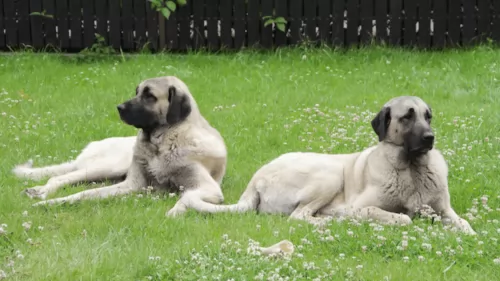 The Kangal Dog can be a wonderful pet in your home, but because you’ve made the decision to bring him into your home, it becomes your responsibility to ensure his happiness and wellbeing.
The Kangal Dog can be a wonderful pet in your home, but because you’ve made the decision to bring him into your home, it becomes your responsibility to ensure his happiness and wellbeing.
These ‘care’ tips can help you, particularly if you’re a first time dog owner -
Remember that a puppy will need 4 meals a day of soft, recommended puppy food. By the time your dog reaches his first birthday, one or two meals a day will be good.
There are some top quality commercial manufactured foods to choose from, and the packaging labeling will guide you to which one.
Adding in some home-made food such as nutritious cooked chicken, rice and vegetables will be a treat for your pet and don’t forget some raw meat occasionally too.
Fresh, cool water should be within reach of your pet around the clock.
Dogs need exercise to maintain their lean bodies but it will also stimulate their minds and keep them healthy. The exercise needs of your dog will depend on his size, age, health and breed type. Fun and games as well as daily walks will satisfy your Kangal Dog and keep him content.
Help keep your Kangal Dog looking groomed and cared for. He is a fairly heavy, seasonal shedder. Remove loose hairs with brushing the coat twice a week. Check for fleas and ticks at the same time and for any unusual lumps.
Every dog needs a warm, dry, quiet place to rest and sleep, inside and outside. Make sure that when your dog is outside that he has a place to rest in the shade and sun, as he chooses.